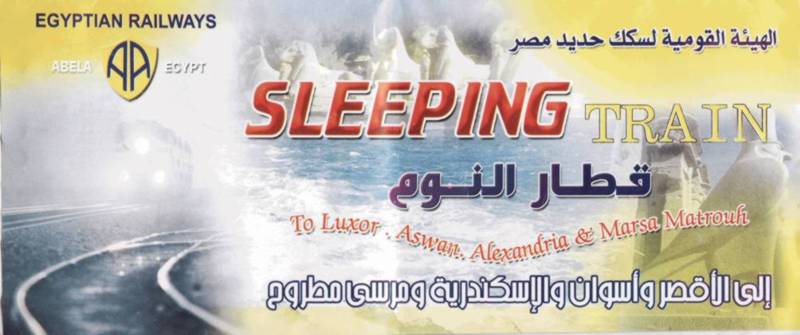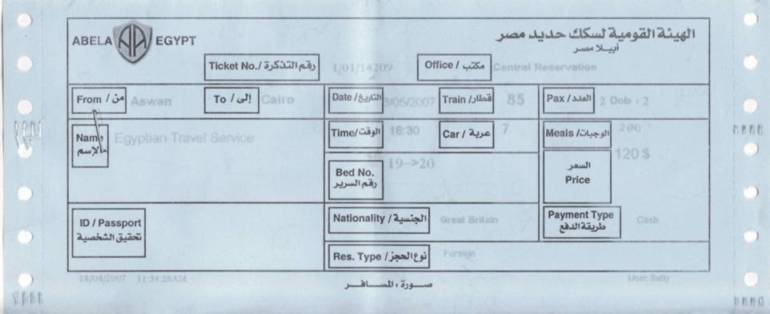يوم الخميس، ١٥ ربيع الثاني ١٤٢٨
| 20 | ٢ | |||
| 21 | ٣ | |||
| 22 | ٤ | |||
| 23 | ٥ | |||
| 24 | ٦ | |||
| 25 | ٧ | |||
| 26 | ٨ | |||
| 27 | ٩ | |||
| 28 | ١٠ | |||
| 29 | ١١ | |||
| 30 | ١٢ | |||
| 1 | ١٣ | |||
| 2 | ١٤ | |||
| 3 | ● | ١٥ | ||
| 4 | ١٦ | |||
| 5 | ١٧ | |||
| 6 | ١٨ | |||
| Aswan |
So with a trip to Abu Simbel ruled out, we decided to enjoy what we could of  EGY Swenet
EGY Swenet
We started in the Keylany's well-reputed rooftop deck with its equally well-reputed breakfast of lemonade, crêpes, toast, cheese, tea (or coffee; but I chose tea), and fruit in juice. It all was delicious, but the crêpes were far and away the best part.
The Rooftop Deck at the Keylany |
Unfortunately, when we returned to the room, Billy checked his voice mail and got a message that his dog, Pepper, was vomiting, listless, and disinterested in food – likely as the result of a "steroid crash" from steroid lowering medicine for her Cushing's disease, a health issue that has plagued her for over a year. All we could do was hope that she would be okay, as we both were powerless halfway around the world. But there was a genuine fear that the pictures we carried in our phones would be the last we saw of her. It was good that we didn't have much going on this day, as we couldn't get ourselves motivated after getting the bad news, so we recommitted ourselves to taking it easy and allowed ourselves the time to rest and to worry.
 |
Pepper |
 We finally left the room at about lunchtime and had a taxi take us to the Nubian House Restaurant, a beautiful place that we learned about through Lonely Planet. We arrived at 12:30 and were told they wouldn't start lunch service until 2:00. I couldn't make sense of this schedule, but we weren't in a hurry, so we chatted with other (similarly confused) travelers, enjoyed the great views of the city of Aswan and the First Cataract, and waited for lunch service to begin. Note that "cataract" generally means "waterfall," but not so in the case of the Nile: This river has no waterfalls in its entire 6,800 km (4,225 miles) – only six rocky shallow areas that are known as its cataracts. The First Cataract (and the only cataract in Egypt) is in Aswan, meaning that there is nary a ripple on the entire 1,200 km (746 miles) between here and the Mediterranean.
We finally left the room at about lunchtime and had a taxi take us to the Nubian House Restaurant, a beautiful place that we learned about through Lonely Planet. We arrived at 12:30 and were told they wouldn't start lunch service until 2:00. I couldn't make sense of this schedule, but we weren't in a hurry, so we chatted with other (similarly confused) travelers, enjoyed the great views of the city of Aswan and the First Cataract, and waited for lunch service to begin. Note that "cataract" generally means "waterfall," but not so in the case of the Nile: This river has no waterfalls in its entire 6,800 km (4,225 miles) – only six rocky shallow areas that are known as its cataracts. The First Cataract (and the only cataract in Egypt) is in Aswan, meaning that there is nary a ripple on the entire 1,200 km (746 miles) between here and the Mediterranean.
During the wait for lunch, we talked with a Spanish couple that we recognized from the hotel. They, too, were organizing their trip with a Lonely Planet: Egipto guidebook.
|
We had a pleasant meal at the Nubian House Restaurant |
| Elephantine Island |
We shared a taxi back to the hotel with the Spanish couple, and then Billy vegged in the room while I sought a felucca to take me to the Aswan Antiquities Museum on ![]() EGY Yebu
EGY Yebu
The felucca was an interesting experience: As the only passenger, I was put into service steering and rowing, and I was pulling oar splinters from my fingers for hours afterward.
|
|
On Elephantine Island I was peeved: With our train to Cairo leaving at 6:30 PM, I had sought from the felucca owner – and had received – assurance that the crossing, visit, and return could be accomplished in an hour (which left me with a little padding for unexpected delays). But the first leg alone had taken twenty minutes. And when we got there he ended up in an argument with people on shore about where to dock – which resulted in me having to climb over the boats of other people to get to terra firma. And on the island it took me fifteen minutes each way between the dock and the museum grounds – through unmarked paths strewn with goats, chickens, sheep, and their respective droppings. Fortunately, I was able to find the Nilometers quickly, and a good sense of direction helped me find my way back to the felucca without getting lost.
|
The island: |
By the time I returned to the shore and clambered to the felucca over the flotilla that served as a bastion between it and the dock, fifty-five minutes of the promised hour had elapsed – and I had a train to Cairo that I absolutely could not allow myself to miss. The felucca owner felt my aggravation.
Even so, I had returned to the boat exhausted and thirsty, so I was glad when he needed a couple of minutes to raise the sails and push off from dock, as this gave me a brief respite to dip my hands in the Nile and splash water on my face in the hope of postponing heatstroke for a few precious minutes. Then it all began anew as he said "Take that oar! Row!
| Train to Cairo |
Then we went to the station to catch the Abela Sleeping Train to Cairo. It was a step up from the previous train, but still not on par with European service. Dinner was decent, and the beverages were reasonably priced despite the fact that they had us hostage. Until it got dark, I took endless pictures of the scenery alongside the tracks – only a few of which were usable.
 |
The Pouch for the Sleeping Train Ticket |
 |
| And the Ticket Itself |
|
The train: |
We spent a few minutes in the club car until we were chased out for not drinking. This was an aspect of the sleeping train I didn't like: the lack of public spaces. Even if I don't interact with the other passengers much, I like being able to walk around a train, sit in the restaurant car, see people, look out the windows. But here you could either drink in the bar or sit in the tiny room; there were no other options.
So we repaired to the cabin and found that it had been converted from chairs to bunk beds. And there we slept, comfortably and well, through the length of Egypt. I worried that I wouldn't sleep well on the train, but it may have been one of the most comfortable nights of my life. But I found it odd on those occasions when I did wake up that I could tell the train was moving, but I couldn't easily tell which direction. This was no bother at all in the comfort of the luxurious Abela Sleeping Train, but memories of Yad Vashem came back to me at this moment, and I couldn't stop myself from thinking of the people trucked to Nazi concentration camps in cattle cars, and how the inability to discern the direction of motion must have added a gut-wrenching (and stomach-turning) confusion to an already-horrific scene. I awoke about three or four times in the night, and that's the thought that came to me every time.
The first of the times I woke up, it bears note, was when a loud announcement was made saying, "A doctor is needed in the Club Car. If there is a doctor on the train, please report to the Club Car." This was repeated several times at about five-minutes intervals. Finally, the announcement was made in Arabic – once, and then no more. I guess they found a local doctor.
But as I have already stressed, our experience was in no way bad: The train was comfortable and (by the standards of the place) luxurious, and the staff made us feel much wealthier than we were. And I must acknowledge this: The train was scheduled to leave Aswan at 6:30 PM, and it left on the dot.
| Main | ||||||||
| 20 | κʹ | |||||||
| 21 | καʹ | |||||||
| 22 | κβʹ | |||||||
| 23 | κγʹ | |||||||
| 24 | κδʹ | |||||||
| 25 | κεʹ | |||||||
| 26 | ח׳ | |||||||
| 27 | ט׳ | |||||||
| 28 | ١٠ | |||||||
| 29 | ١١ | |||||||
| 30 | ١٢ | |||||||
| 1 | ١٣ | |||||||
| 2 | Previous | الأخير | ١٤ | |||||
| 3 | ١٥ | |||||||
| 4 | Next | التالي | ١٦ | |||||
| 5 | ١٧ | |||||||
| 6 | ١٨ | |||||||
